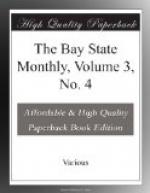The creditable manner in which Mr. Long conducted the affairs of the State induced his constituents to send him as their representative in Washington. He was elected a member of the Forty-eighth Congress, and is now a member also of the Forty-ninth. His record thus far has been altogether honorable and characterized by a sturdy watchfulness of the interests entrusted to his care.
As a man of letters. Governor Long has achieved a reputation. Some years ago, he produced a scholarly translation, in blank verse, of Virgil’s AEneid, which was published in 1879 in Boston. It has found many admirers among students of classical literature. Governor Long, amid busy professional and official duties, has also written several poems and essays which reflect credit upon his heart and brain. His inaugural addresses were masterpieces of literary art, and the same can be said of his speeches on the floor of Congress, all of them, polished, forceful and to the point.
Mr. Long is a very fluent speaker, and, without oratorical display, he always succeeds in winning the attention of his auditors. It is what he says, more than how he says it, that has won for him his great popularity on the platform. When, in February last, the Washington monument was dedicated, he it was that was chosen to read the magnificent oration of Robert C. Winthrop.
As a specimen of Mr. Long’s happy way of expressing timely thoughts, the following passage, selected from an address which he delivered at Tremont Temple, Boston, on Memorial Day, 1881, deserves to be read:—
“Scarce a town is there—from Boston, with its magnificent column crowned with the statue of America at the dedication of which even the conquered Southron came to pay honor, to the humblest stone in rural villages—in which these monuments do not rise summer and winter, in snow and sun, day and night, to tell how universal was the response of Massachusetts to the call of the patriots’ duty, whether it rang above the city’s din or broke the quiet of the farm. On city square and village green stand the graceful figures of student, clerk, mechanic, farmer, in that endeared and never-to-be-forgotten war-uniform of the soldier or the sailor, their stern young faces to the front, still on guard, watching the work they wrought in the flesh, and teaching in eloquent silence the lesson of the citizen’s duty to the state, How our children will study these! How they will search and read their names! How quaint and antique to them will seem their arms and costume! How they will gather and store up in their minds the fine, insensibly filtering percolation of the sentiment of valor, of loyalty, of fight for right, of resistance against wrong, just as we inherited all this from the Revolutionary era, so that, when some crisis shall in the future come to them, as it came to us, they will spring to the rescue, as sprang our youth, in the beauty and chivalry of the consciousness of a noble descent.”
* * * * *




